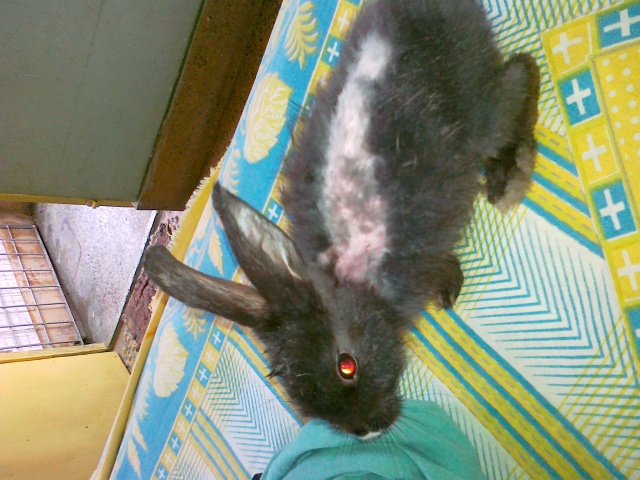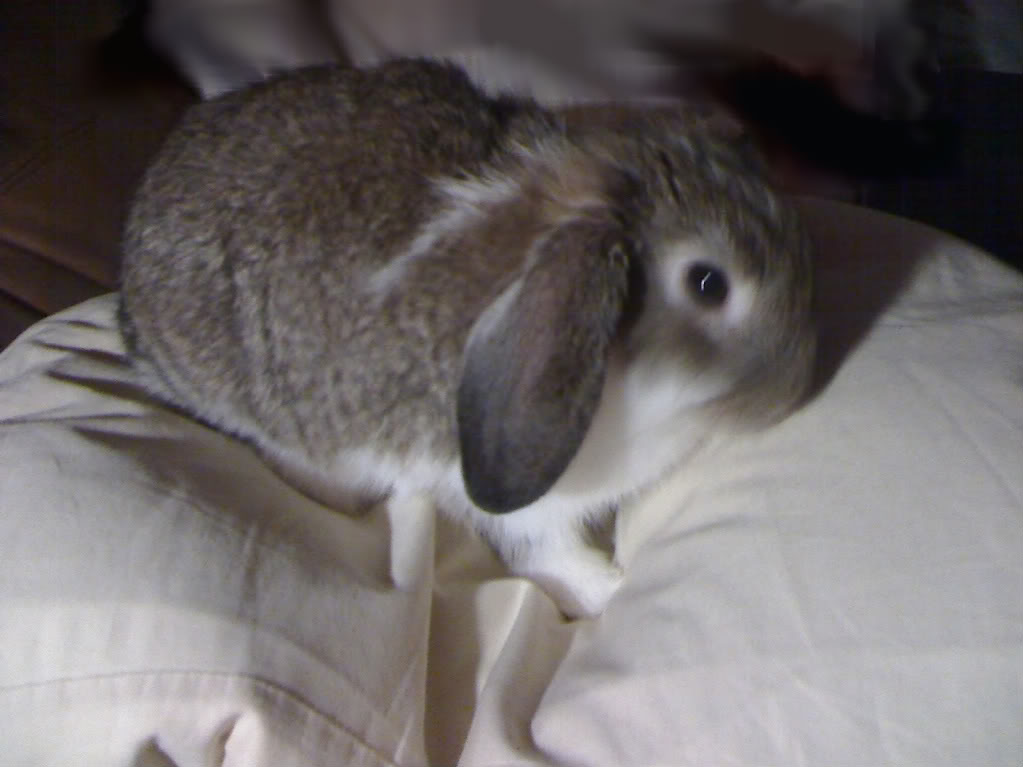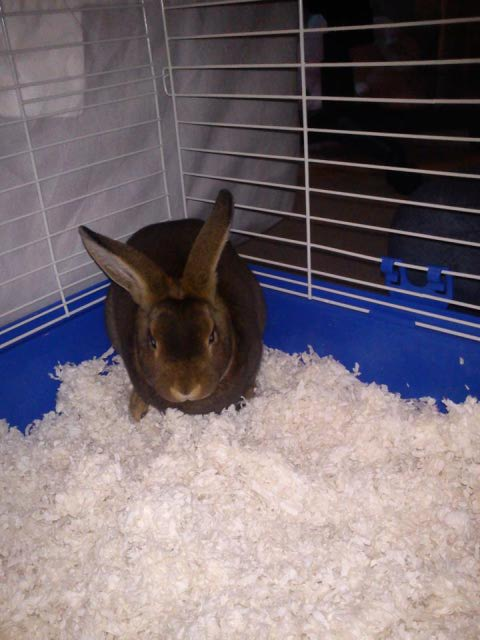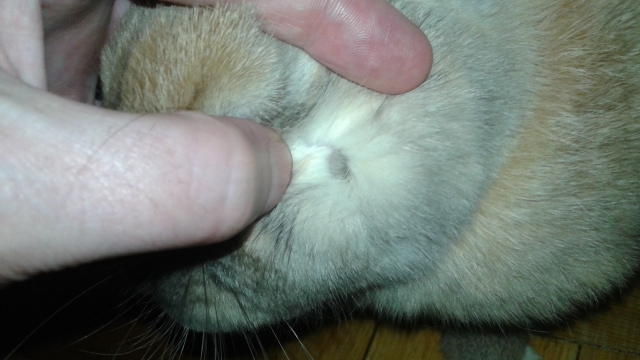QuestionQUESTION: I am currently in Cusco, Peru and have had my first pet rabbit for two weeks
now. It is a weaned youngster. He has developed signs and symptoms of
Pasteurella Multocida and is experiencing substantial night time breathing
difficulty. I am deeply concerned.
I love this rabbit and take pet care seriously so I took him to a local vet last
week who laughed at me trying to care for a rabbit.. they are almost strictly a
food item within the local culture. He gave a two day course of injected
Penicillin last week. It helped a bit but then the symptoms returned. There
was no mention of this terrible disease.
I took him to another vet this week and was told it was probably allergies. I
was given a week long course of antihistimines and have done my best to
isolate an possible allergens. Again, no mention of this disease from the vet.
Once it became apparent that the antihistimines were not working, I did a
thorough online search and learned about Pasteurella. I made the mistake of
trusting the local vets and now it might cause my rabbit his life.
My question is this... given that I cannot trust the knowledge base here and
am going to have to direct treatment myself...
Can you give me a treatment course that will be both reasonably safe and
effective so that I can at least double check what the vet is going to do?
I know time is of the essence and have all ready waited too long. Last week
when he was weighed the rabbit was 320 grams. At his current growth rate I
would guess he would be about 350 grams now. I understand injected Baytril
(enrofloxacin) is the accepted best initial course. From what I understand he
should get 2x daily injections.
I need to know how many days to sustain the course for, as the information
on the internet is contradictory. I am leaning towards a two week minimum to
make sure we don't miss to many and get a resistant strain? Does that sound
right?
Also, what dose would you recommend? The best mean I could find for his
weight class was 3.5 mg every 12 hours (assuming a 5-15 mg dose per KG
body weight). What do you think of that?
Any other info you could give would be helpful. I understand that in a perfect
world I would turn this over to a qualified vet but I am basically on my own. I
would like to give supportive aftercare as well with some probiotics... I don't
know what I can find here but I can certainly try if I can get a product name
and dosage.
Thank you so much for taking the time to help.
Russ
ANSWER: Dear Russ,
Baytril can be given either orally or by injection, but be *very* cautious about injections because the drug (or the carrier; I'm not sure which) causes nasty tissue damage and sterile abscesses at the site of injection. When we have to use injectable Baytril, we give it IM. But if you can get injectable Baytril, it can be given orally, too, if you mix it with something palatable.
The dose our vets use for Baytril or cipro (Baytril is metabolized into ciprofloxacin, so if you can get that, it will work just as well. You will just have to compound it. Let me know if you need instructions on how to do this.) is 20mg/kg twice per day. In my experience, the 5-15 mg/kg is a bit too low, and it's better to load up, at least for the first five doses or so.
Any of the fluoroquinolones (e.g., Baytril) would be a reasonable choice to try: Baytril (enrofloxacin), ciprofloxacin, levaquin, marbofloxacin (a.k.a. zeniquin), etc. All have essentially the same mode of action, but slightly different chemical formulas (the better to "fool" the pathogen who has become resistant to one). I do think a course of at least two weeks would be wise, considering he had a relapse.
Please also see:
www.bio.miami.edu/hare/sneezing.html
Good luck! I hope your little one will be well soon.
Dana
---------- FOLLOW-UP ----------
QUESTION: Dear Dana,
Thank you so much for the extremely helpful answer. I hate to take more of
your time, but I need to ask a follow up question so I know I am doing the
right thing for my rabbit.
Essentially I told the vet that I wanted to proceed with a oral (taking your
advice about the injected) Baytril or Cipro course of 20mg, two times a day for
two weeks minimum. The vet said they did not feel it was bacterial and urged
me to get a swab done because, of course, antibiotics are dangerous for
rabbits. Not being sure about rabbit reactions to antibiotics (but having taken
the time to read on the internet and thus knowing that they have very delicate
systems), I agreed to this and the test came back negative for all bacteria.
I had to wait three long days for the culture and he kept getting worse. The
vet then said it is definitely not a bacteria and suggested I isolate him from
any possible allergens (which is of course impossible but I have tried) and put
him on a course of corticosteriods. It has been three more days of this and my
rabbit is still getting worse! As all this was developing the vet had earlier
insisted it was allergies and given him some antihistamines with zero effect. I
feel this is indicative that it is not allergies.
He is sneezing literally ALL the time now and is making squeaks that sound
like pain. He has no hair on his nose left from rubbing it. I have not noticed
any eye or ear problems but I am at my wits end and really just am having my
heart break to see him suffer so much. I am afraid he is going to suffocate to
death. He is still eating and getting (and giving!) lots of attention though and
his life is worth living.
My question is this... I know one can never know the outcome of treatment...
that is not what I am asking for. However, I need a basic understanding of
how dangerous the course of Baytril or Cipro we have discussed is? I mean, I
know very well false negatives exist for tests and though I would never use
medicate anything without cause... IF it is not TOO dangerous I just don't see
what there is to lose at this point.
Is this a reasonable point of view? I feel I should give him the course
antibiotics if the risk is minimal/reasonable. I have absolutely no way to
assess that risk though. I am quite familiar with human reactions to
antibiotics and if it was a human I would go for it without hesitation. This is
my first rabbit though and I don't want to kill him after getting a negative lab
report just because my gut says that his condition is deteriorating every day I
leave him.
If you were in my situation, what would you do? I don't expect miracles and I
know he might die no matter what I do o I am not looking for a perfect
answer...
If you do think I am right in treating him with antibiotics once his steriods
course is over (2 days) then I will have to take you up on your offer to describe
the compounding process.
Thanks again. It is really amazing that you go out of your way with your time
and effort as you do.
Russ
AnswerDear Russ,
To answer your most important question: "If you were in my situation, what would you do?"
1. Get him OFF the steroids as quickly as humanly possible. The vets where you are obviously are not very well versed in rabbit medicine, and are not aware that corticosteroids are very dangerous to rabbits, and are contraindicated in most cases. Certainly in the case of an upper respiratory infection, since corticosteroids suppress the immune response!
2. Get him ON oral Baytril or ciprofloxacin ASAP. Not 20mg. Twenty *milligrams per kilogram*. This antibiotic is completely safe for rabbits, and enro/ciprofloxacin has saved the lives of literally *thousands* of rabbits. It will not upset the GI flora, and the vets are wrong to think that rabbits react badly to antibiotics. They react badly (or, rather, their GI flora react badly) to *some* antibiotics, but a great many are safe and effective, depending on the particular pathogen causing the sickness.
3. A nasal swab that comes back "negative for all bacteria" just doesn't happen. The nose is *loaded* with bacteria, though many of them are non-pathogenic. So I would really question these lab results.
PLEASE insist that the vet give you ciprofloxacin, even if you have to tell him you'll take full responsibility for whatever happens. This is NOT an allergy. Allergies are incredibly rare in rabbits with signs like this, compared to how often it is caused by bacterial infection. Please see:
www.bio.miami.edu/hare/culture.html
To clear his nasal passages, you might be able to gently suction his nose with a pediatric ear bulb/syringe like this one:
http://www.amazon.com/hcl820-Ear-Syringe-Pediatric/dp/B000VI8D64
A gentle nasal flush might help, but I would not try this unless you can be instructed by a vet who is very familiar with this procedure.
I hope you can get some antibiotics NOW, and even possibly ask for both *injectable* Penicillin-G Procaine (the ONLY type of penicillin-class drug safe for rabbits; accept NO other type, especially if given orally) and oral ciprofloxacin. The Pen-G works incredibly fast, and can start killing pathogenic bacteria within 15 minutes of administration. So I hope this is an option you'll be able to try.
Do not stop the corticosteroids suddenly. You need to wean him off gradually, giving half the dose next time, then 1/4, and so on until you stop completely. But get him off the steroids ASAP.
I hope he will be well soon, with proper treatment.
Good luck!
Dana

 Rabbit has gas daily, stumped.
QuestionQUESTION: Hello!
Thank you so much for being a
Rabbit has gas daily, stumped.
QuestionQUESTION: Hello!
Thank you so much for being a
 Is my rabbit sheding or has some other problem?
Questionbald rabbit
QUESTION: I am Indrani from
Is my rabbit sheding or has some other problem?
Questionbald rabbit
QUESTION: I am Indrani from
 General Health Questions and a Squinty Eye
QuestionQUESTION: I have a few health questions after r
General Health Questions and a Squinty Eye
QuestionQUESTION: I have a few health questions after r
 Rabbit breed
Question
Charlie
My parents recently brought me
Rabbit breed
Question
Charlie
My parents recently brought me
 black spots on Boos face
Question
boos face
I recently noticed some lumps
black spots on Boos face
Question
boos face
I recently noticed some lumps